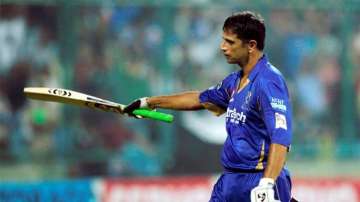Rahul Dravid kickstarted his IPL journey at Royal Challengers Bangalore, but he is fondly remembered in the league for his stint with Rajasthan Royals. After spending the first three seasons of the league in his home side, he switched to Rajasthan franchise where he spent his time as the captain and mentor of the side.
The Royals qualified for the CLT20 in 2013 under his captaincy when they finished third in the IPL. He also mentored the side a year later.
Under Dravid, the side's reliance on data and analysis was significant. He also brought a number of tweaks in the side's formations during his time - one such example was that of Australian batsman Brad Hodge.
Primarily a top-order batsman, Hodge played as a finisher for the Royals under Dravid. The former Indian captain has now revealed the reason for this change.
“One of the things we noticed was Brad Hodge... had a phenomenal T20I record in Australia and had probably played 5-6 IPLs, and had a very average or poor record in India. Once we looked at the data closely, we sort of realised why he was struggling in India. He was clearly a player who was very good against fast bowling, but wasn’t very good against, say, left-arm spin bowling and leg spin. But he had an incredible strength of being good against fast bowling," Dravid said on the Insights vs Insights panel talk.
“One of the things we looked at was, which is the position of the game where someone like Hodge will play only fast bowling, and we sort of looked at the last four-five overs where everyone brings their best death bowlers back into the game. We decided at that stage that we will buy him in the auction, and bat him in the last 5-6 overs in the match,” Dravid added.
Dravid further said that Hodge remained a bit hesitant when he was asked to play the role of a finisher, but he accepted to do so when presented with statistics and analysis.
“Hodge, as you know, is an Australian batsman who is really proud of his batting ability, and he is used to batting in the top three in Australia. He was obviously resistant to this when we told him initially. But then we were able to show him data, and his success against fast bowling, and how critical it was for a team like us [that] didn’t have the firepower – like CSK had [MS] Dhoni, MI had Kieron Pollard or RCB had an AB de Villiers," said Dravid.
“In a team like that, we told him, ‘You are the best bet in the last five overs and here’s the data to show why you have been unsuccessful in the IPL and what we can do to help you become successful’.” “He scored much fewer runs than he would have if he batted at three but this gave us the best chance to get the best out of him."

